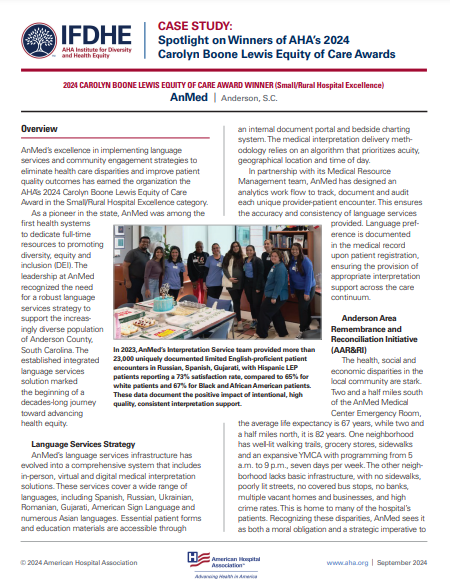2024 Equity of Care Awards Case Study: AnMed
2024 Equity of Care Awards Winner (Small/Rural Hospital Excellence)
Overview
AnMed’s excellence in implementing language services and community engagement strategies to eliminate health care disparities and improve patient quality outcomes has earned the organization the AHA’s 2024 Carolyn Boone Lewis Equity of Care Award in the Small/Rural Hospital Excellence category.
As a pioneer in the state, AnMed was among the first health systems to dedicate full-time resources to promoting diversity, equity and inclusion (DEI). The leadership at AnMed recognized the need for a robust language services strategy to support the increasingly diverse population of Anderson County, South Carolina. The established integrated language services solution marked the beginning of a decades-long journey toward advancing health equity.
Language Services Strategy
AnMed’s language services infrastructure has evolved into a comprehensive system that includes in-person, virtual and digital medical interpretation solutions. These services cover a wide range of languages, including Spanish, Russian, Ukrainian, Romanian, Gujarati, American Sign Language and numerous Asian languages. Essential patient forms and education materials are accessible through an internal document portal and bedside charting system. The medical interpretation delivery methodology relies on an algorithm that prioritizes acuity, geographical location and time of day.
In partnership with its Medical Resource Management team, AnMed has designed an analytics work flow to track, document and audit each unique provider-patient encounter. This ensures the accuracy and consistency of language services provided. Language preference is documented in the medical record upon patient registration, ensuring the provision of appropriate interpretation support across the care continuum.
Anderson Area Remembrance and Reconciliation Initiative (AAR&RI)
The health, social and economic disparities in the local community are stark. Two and a half miles south of the AnMed Medical Center Emergency Room, the average life expectancy is 67 years, while two and a half miles north, it is 82 years. One neighborhood has well-lit walking trails, grocery stores, sidewalks and an expansive YMCA with programming from 5 a.m. to 9 p.m., seven days per week. The other neighborhood lacks basic infrastructure, with no sidewalks, poorly lit streets, no covered bus stops, no banks, multiple vacant homes and businesses, and high crime rates. This is home to many of the hospital’s patients. Recognizing these disparities, AnMed sees it as both a moral obligation and a strategic imperative to lead a community conversation on racial reconciliation.
In early 2020, amid growing awareness of racial injustice, local communities sought ways to address these long-standing disparities. A small group of Anderson County community members came together virtually to discuss the social unrest following the highly publicized murder of George Floyd. This group evolved into the Anderson Area Remembrance and Reconciliation Initiative (AAR&RI). The goal of AAR&RI is to honor the five known victims of racial terror lynching in Anderson County and engage the community in discussions about the history and lasting impact of racial and economic injustice.
Impact
The results of AnMed’s language services strategy are measurable and significant. In 2002 the system provided approximately 5,000 documented encounters for limited-English proficient (LEP) patients, but by 2022, this number had increased to over 21,750 encounters. Patient experience ratings also reflect the success of the program, with Hispanic patients reporting a 73% satisfaction rate, compared to 65% for white patients and 67% for African-American patients. These ratings demonstrate the positive impact of intentional, high quality and consistent provision of language services.
Partnering with the Equal Justice Initiative in Montgomery, Ala., AAR&RI aims to raise awareness and inspire action through conversations, enlightenment and public art to move toward a “Beloved Community.” The initiative commissioned a work of art honoring the five known victims of lynching, with donations exceeding $75,000, including significant contributions from the AnMed Foundation and Duke Energy South Carolina. Foundation and Duke Energy South Carolina.
The artwork, designed by Anderson native Herman Keith Jr., features soil collected from the five lynching sites and has been exhibited across Anderson County. This sculpture, made of wood and metal, is designed in harmony with the national art installation in tribute to lynching victims in Montgomery. The story of AAR&RI is on permanent display at the Anderson County Museum and memorialized on Main Street, steps away from City Hall.
In 2021, the AnMed Board of Trustees, Anderson University Board of Trustees, Anderson City Council and Anderson County Council issued formal support to AAR&RI. More than 1,000 Anderson County residents have participated in this reconciliatory effort, demonstrating widespread community commitment to addressing systemic racial and economic injustice.
Future Goals
AnMed is committed to continuing and expanding its initiatives to ensure culturally appropriate patient care. Future goals include expanding the range of languages supported by interpretation services, improving the integration of language services across all areas of patient care, and increasing community outreach to ensure that all members of Anderson County’s diverse population are aware of and can access these services. Strengthening partnerships with local organizations to support high-risk populations, including those with limited English proficiency, remains a priority.
The system’s comprehensive health equity infrastructure, ongoing commitment to quality improvement, and measurable community impact demonstrate the importance of prioritizing equitable care and outcomes for all individuals. Through continuous evaluation and adaptation, AnMed ensures that every patient receives the care they need, regardless of language barriers. Additionally, AnMed’s active role in racial reconciliation underscores its dedication to fostering a more just and equitable community for all. AnMed’s commitment to health equity is evident in its efforts to ensure that every initiative and service contributes to a more inclusive and just health care system.


